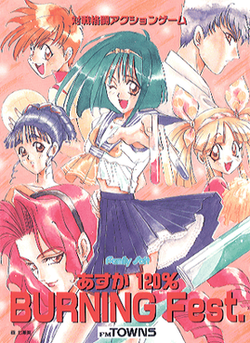Asuka 120%

Front cover of the FM Towns version of Asuka 120% BURNING Fest., the first version of the first title of the series. Illustrated by Aoi Nanase
|
|
| Developer(s) |
Fill-in-Cafe (insolvent) Success (Final and Return) |
|---|---|
| Publisher(s) | FamilySoft |
| Designer(s) |
Masatoshi Imaizumi Aoi Nanase |
| Composer(s) | Keishi Yonao |
| Platform(s) | FM Towns, X68000, TurboDuo, PC-Engine, Sega Saturn, PlayStation |
| Release |
|
| Genre(s) | Fighting game, bishōjo |
| Mode(s) | 1–2 players |
Asuka 120% BURNING Fest. (あすか120% BURNING Fest.?) is a Japanese fighting game series produced by Fill-in-Cafe that was published and distributed by FamilySoft and Kodansha. The franchise was programmed and designed by Masatoshi Imaizumi, its music was composed by Keishi Yonao, and the games' illustrations were designed by Aoi Nanase. Categorized as a bishōjo game, eleven versions were released for various platforms between 1994 and 2002.
The game is set at the Ryōran Private School for Women which educates the daughters of the upper echelons of society. The school's clubs hold a martial arts tournament called the Club Rivalry Budget Contest Mega Fight annually. Each character employs a different fighting style and the techniques are unique to each club. The original characters are female categorizing Asuka 120% Burning Fest as a bishōjo game.
A dubbed version, Asuka 120% Special BURNING Fest was released for the PlayStation in 1996, followed by a balanced update released as Asuka 120% Excellent BURNING Fest In 1997 Asuka 120% Limited BURNING Fest was released for the Sega Saturn with substantially revised graphics and many changed characters.
Using the graphics from Limited, Asuka 120% Final BURNING Fest was released for the PlayStation in 1999, coupling the graphics engine of Limited with overhauled fighting mechanics. The voice cast was largely replaced with new actors. Despite these changes, the game did not recover its popularity.
Asuka 120% was produced by just two full-time programmers who comprised Fill-in-Cafe. After the developers moved on to Treasure, the Asuka 120% input system influenced future Treasure fighting games. Development for the X68000 was done by Mad Stalker and for the PlayStation by Makeruna! Makendō 2: Kimero Youkai Souri for Fill-in-Cafe (which went bankrupt around 1998).
...
Wikipedia
